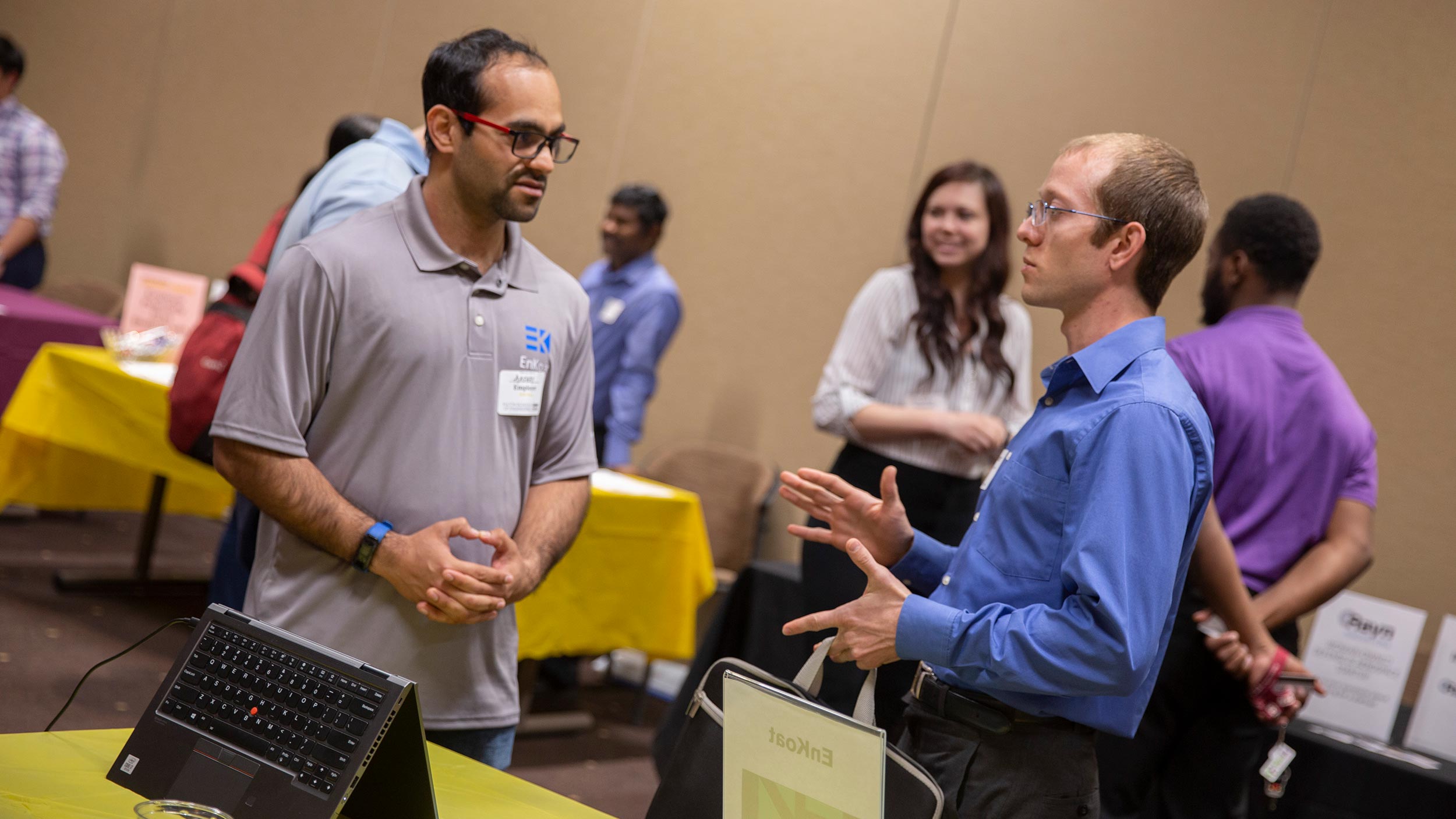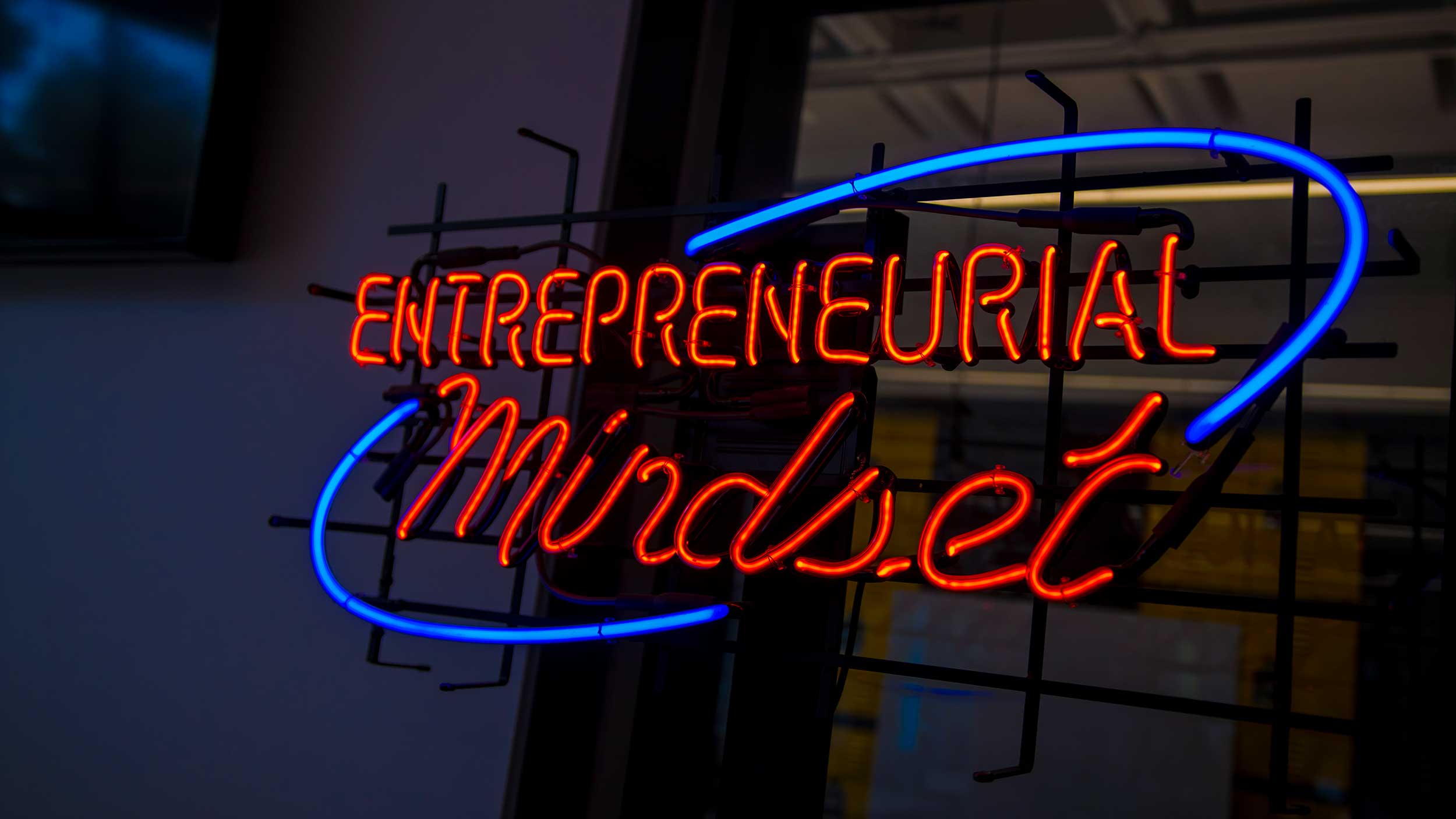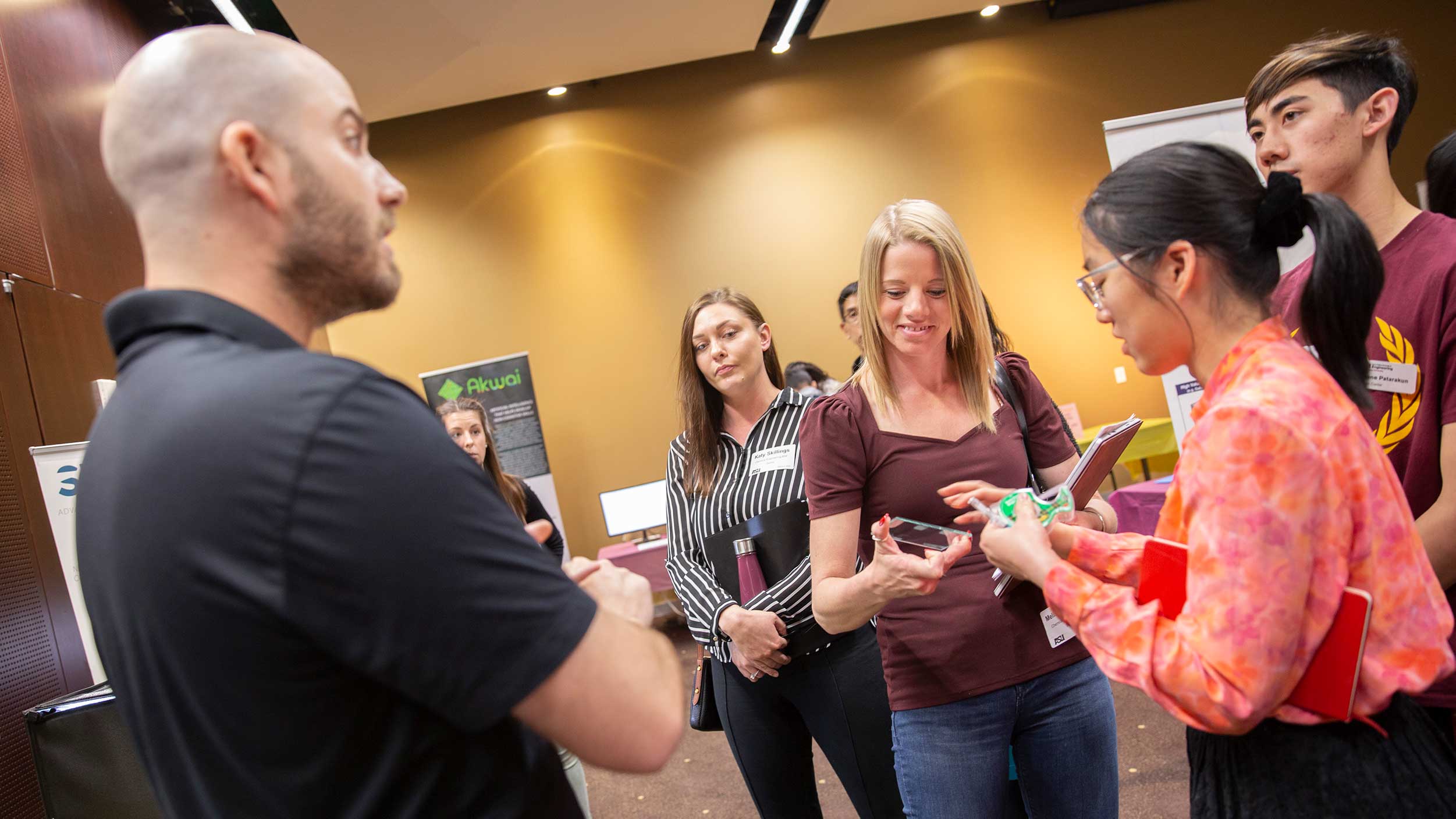Building a culture of possibility
Convergence magazine > Building a culture of possibility
Catalyzing entrepreneurial mindsets and innovative ventures in the Fulton Schools
“One of the best aspects about working here is transforming good ideas into reality,” says Zachary Holman, an associate professor at Arizona State University. “Anyone developing an innovative new solution can find the support to make it happen. This sense of possibility permeates our culture.”
Holman directs the faculty entrepreneurship program at ASU’s Ira A. Fulton Schools of Engineering, where students, faculty and staff are all encouraged to find a way to make a difference in society. While the same might be said of their peers at universities across the country and the world, the Fulton Schools has a remarkable array of resources that create a unique hub of technical entrepreneurship in the nation’s largest engineering program.
“Academics spend a lot of time thinking about how to solve interesting problems,” Holman says. “But we traditionally devote much less time to determine whether those solutions matter to the broader world. Consequently, we want to create researcher-entrepreneurs at the Fulton Schools. We want people pursuing real impact.”
Cultivating an entrepreneurial mindset is central to the Fulton Schools’ mission. For example, beginning in the fall of 2020, newly hired faculty members will attend workshops that teach them how to pursue truly meaningful research, and get programmatic support if they wish to commercialize their work.
“Up to 40 of us gather each month to share experience and expertise,” Holman says. “We call ourselves the Fulton Faculty Founders or ‘Triple-F Squad.’ One person may know a good intellectual property attorney, while someone else may be able to help with lab space for rent. We promote best practices in support of new ventures across our cohort.”

Aashay Arora (left), cofounder of the startup EnKoat, participated in the inaugural ASU Entrepreneurship + Innovation Career Fair to meet prospective employees and engage with fellow startup founders. Most of the ventures represented in the fair began at ASU.
The Fulton Schools also offers a “customer-discovery,” or market analysis training program that prepares faculty-student teams to participate in a six-week, National Science Foundation Innovation Corps experience designed to help move research from the laboratory to the marketplace.
Additionally, up to three Fulton Entrepreneurial Professors fellowships are available each year to support faculty members who are at the cusp of technology commercialization. Those chosen are awarded $100,000 annually for up to two years to accelerate the success of their ventures.
“The program releases you from teaching and enables you to hire someone to make sure that your lab group remains stable while you devote time to getting your new company up on its own two feet,” says Visar Berisha, an associate professor with both the Fulton Schools and ASU’s College of Health Solutions.
Berisha was selected for a fellowship in 2017 and says the experience was vital to launching Aural Analytics, a business he co-founded to market a new tool that diagnoses and monitors neurological disorders using speech patterns.
“It’s difficult to get people to invest in a concept if the founders can’t offer their undivided attention,” Berisha says. “So, this fellowship certainly made a difference to investors. In the end, we were able to be selective about which venture capital firm we wanted to work with.”
“At the same time, pursuing innovation with market value does not compromise your advancement as an academic here,” Berisha adds. “Even the guidelines for earning tenure within the Fulton Schools embrace entrepreneurship. This mindset is actually part of how we are evaluated.”
“Pursuing innovation with market value does not compromise your advancement as an academic here. Even the guidelines for earning tenure within the Fulton Schools embrace entrepreneurship. This mindset is actually part of how we are evaluated.”
– Visar Berisha

“Pursuing innovation with market value does not compromise your advancement as an academic here. Even the guidelines for earning tenure within the Fulton Schools embrace entrepreneurship. This mindset is actually part of how we are evaluated.”
– Visar Berisha
The entrepreneurial mindset extends beyond faculty circles and across the entire engineering community at ASU, which includes campus facilities not traditionally recognized as innovation hubs.
“We have a tremendous range of resources within our library system,” says Eric Prosser, the engineering and entrepreneurship librarian at ASU. “I help our Fulton Schools students and faculty in searching through fewer proverbial haystacks to find more needles.”
“For example, we see some people with novel ideas who immediately want to obtain a patent. While a patent might be important at some point, getting one is often not your first priority,” Prosser says. “Do you know the current market for your idea? Are you aware of the relevant industry standards and any regulations related to developing your concept? These are crucial early questions, and my colleagues and I can help you to quickly find answers.”
“Beyond research support, libraries are uniquely positioned as a crossroads of all disciplines on campus,” Prosser says. “So, I also seek to create broad partnerships that help our engineering students and faculty to develop their innovations with insights from peers in other ASU schools and programs who are doing complementary work.”
Making connections is overtly the goal of ASU’s Entrepreneurship + Innovation Career Fair. The inaugural event in March 2020 facilitated internship and hiring discussions among nearly 200 Fulton Schools students and 20 startup ventures led by ASU faculty, students and alumni.
“It certainly exceeded my expectations,” says Holman, whose Swift Coat glass technology startup participated in the fair to hire three new engineers. “A panel of seasoned startup veterans shared real-world insights with the students and others attending, and the room was filled with conversation for hours.”
Fair attendees also received a glimpse into ASU’s new master’s degree in innovation and venture development. The program is offered through a partnership among three ASU entities — the Fulton Schools, the W.P. Carey School of Business and the Herberger Institute for Design and the Arts. Starting in the fall of 2020, the first cohort of graduate students will collaboratively create and develop new ventures as they explore a rigorous framework designed to instill entrepreneurial leadership.

Peter Firth, CEO of the ASU spinout Swift Coat, talks to potential future employees at the ASU Entrepreneurship + Innovation fair. Swift Coat specializes in nano-coatings that reduce dirt buildup on solar panels, allowing them to maintain consistent energy production over their lifetime.
The emergence and growth of a program like this one has the potential to raise the level of knowledge and competition within Venture Devils, the cornerstone of ASU’s extensive innovation development resource network.
Led by Brent Sebold, director of Entrepreneurship + Innovation at the Fulton Schools, Venture Devils helps founders commercialize new products and services.
“We actually think of Venture Devils as an inclusive league of practicing entrepreneurs,” says Sebold. “We open the door five times a year for anyone within our community who wants to start advancing a new venture. You need only a company name, a logo, a web landing page, a first-draft executive summary and a first-draft pitch deck. And there are plenty of resources available to get you to that point of admission.”
The low barrier to entry translates into high popularity. More than 400 startup ventures now populate the Venture Devils league, and fully half of them are the initiatives of Fulton Schools students, faculty and alumni.
“When you are in, you stay in,” Sebold says. “For as long as you want to drive your venture forward, you have access to dedicated mentoring, working space, labs and funding.”
On the funding front, more than a third of Venture Devils engineering startups compete for a share of $500,000 that is awarded through the fall and spring semester Demo Day competitions, during which teams pitch their nascent ventures to panels of judges.
“Funding entrepreneurial activity from the Fulton Schools community is certainly important. As well, a lot of skill development and professional networking happens through Demo Days and other high-profile events, such as our annual, outward-facing ASU Innovation Open tech startup competition. They all help innovators down the path to creating new businesses,” Sebold says.
“However, the scope remains broader than commercialization. It’s leveraging expertise in ways that maximize collective benefit. We actively embrace and promote that mindset.”
Gary Werner
Science writer, Ira A. Fulton Schools of Engineering
(480) 727-5622 | [email protected]